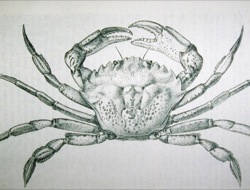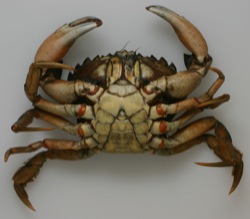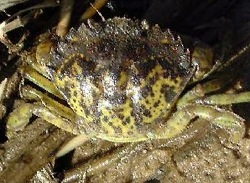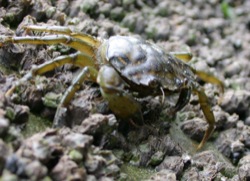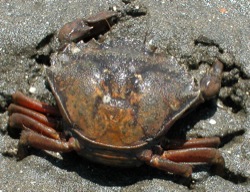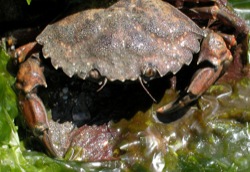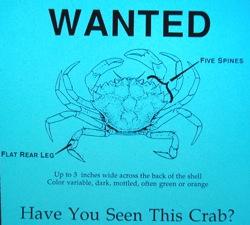7
A large male
Carcinus maenas with an orange shell. Found underneath a seaweed-covered rock in San Francisco Bay.
Return to Top
6
A large male
Carcinus maenas with an orange shell. Found at low tide in a flooded pit dug by a bat ray (
Mylobatus californicus) on the eastern shore of San Francisco Bay.
Return to Top
5
A young (probably first year)
Carcinus maenas with a green shell, in San Francisco Bay.
Return to Top
4
A young
Carcinus maenas with a yellowish-green shell, in a salt pond on Long Island, New York.
Return to Top
3
Underside of the same specimen.
Return to Top
Carcinus Key
A male
Carcinus maenas from San Francisco Bay. Note the shape of the carapace with 5 spines along the edge between the eye socket and the widest point of the carapace, the 3 rounded projections between the eyes, the 2 arcs of white spots on the back, and the somewhat flattened rear legs.
Return to Top
Carcinus maenas Image 1
Carcinus maenas collected at Wood’s Hole, Massachusetts in 1882, drawn by J.H. Emerton.
Return to Top
Carcinus maenas Linnaeus, 1758
GREEN CRAB, EUROPEAN GREEN CRAB, EUROPEAN SHORE CRAB
Carcinus maenas has a roughly
hexagonal or fan-shaped shell with five teeth or blunt spines along the edge
of the shell behind the eye. The first of these teeth forms the hind margin
of the eye socket, and the fifth is at the widest part of the shell. No other
crab found on Pacific Coast shores has five teeth on the edge of the shell
behind each eye. Carcinus maenas also has three rounded teeth or
lobes between its eyes, and somewhat flattened rear legs.
Return to Top
Geukensia demissa Image 8
A tussock of the cordgrass
Spartina alterniflora and
Geukensia demissa lifted by ice in a salt pond on Long Island, New York.
Return to Top
7
An aggregation of
Geukensia demissa in winter, in a salt pond on Long Island, New York.
Return to Top

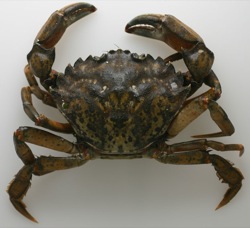 Carcinus maenas
Carcinus maenas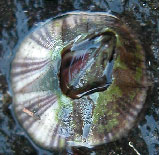 Balanus amphitrite
Balanus amphitrite